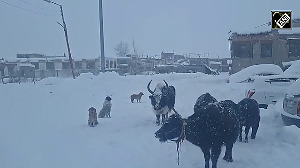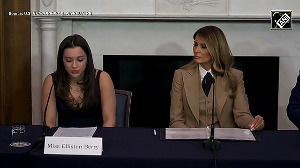The United States is persuading Islamabad that it faces a greater threat from terrorist groups which it had earlier nurtured than from India, a well known American expert on South Asia has said.
"What the United States has been trying to do is to persuade the Pakistani government that these are now Frankenstein's monsters that threaten you a lot more than India does; you ought to clean them out, the Pakistanis prefer to hedge their bets," Stephen Biddle, Senior Fellow for Defence Policy at the Council on Foreign Relations, said.
"So what we've got is an intermediate outcome where Pakistan isn't as supportive of them as they once were but neither do they completely wipe them out," Biddle told reporters in a conference.
The US government, he said, is working very hard to try and influence Pakistan's military, government and intelligence services to be less tolerant to various terrorist groups within their borders that they have historically been pretty supportive of.
"Now, the problem here is, so far, we have been telling the Pakistanis to do something that the Pakistanis themselves don't believe is in their self-interest," he said.
Many of the terrorist groups in Pakistan that the US worries about were either set up or are the progeny of organisations that were set up by Pakistanis as asymmetric warfare devices against India prior to 2001, Biddle said.
These groups then turned against the government there in part because the latter aligned with the US after 2001 when the Bush administration categorically said "either you side with us against the Taliban or we're going to get rid of you", he added.
"Musharraf backed down, sided with the US and, you know, substantially alienated lots of Islamist militant organisations within his own borders, which then turned on the Pakistani civilian government, but the Pakistanis have tended to believe ever since then that these are people that they can work with and that they don't want to completely annihilate them because they still think that they're going to be potentially useful in dealing with the Indian threat that they believe they still face down the road," he observed.
Biddle said sending more US troops inside Pakistan could be more counterproductive than achieving its goal. "The problem here is that the Pakistani government and public's tolerance for a substantially more forceful US conduct of counter-insurgency or counter-terrorism operations in Pakistan is obviously very limited. You could end up, if you did this too forcefully, causing the very thing you're trying to prevent..," he said
This could easily end up in the government's collapse there and that would be a "catastrophe". It would be "radically harder" to wage a full-scale counter-insurgency in Pakistan going by the way the US was "strapped" in trying to enforce a similar small level plan in Afghanistan, Biddle added.
"So, I think the notion that the United States could solve the underlying problem by going to war in Pakistan, as opposed to going to war in Afghanistan, is unrealistic," he said.
"Now, some -- reportedly, including the Vice-President -- have argued that what we really ought to do is simply to rely more heavily than we do now on the kinds of drone strikes against Al Qaeda per se that we are now doing in Pakistan and throttle back dramatically on counterinsurgency activities in Afghanistan..."
The problem is that what that amounts to is taking one piece of ordinary counterinsurgency theory out of the context of the rest of it and not doing the rest of it, he said.
"I mean, if the Pakistan government's own counter- insurgency campaign fails and that government collapses, the problem is going to expand radically beyond the ability of any program of drone strikes to deal with," Biddle said, adding such strikes in a country that could end up in chaos is not a sufficient solution to the problem.
It would rather look more like a "band-aid than like a real answer," he added.






 © 2025
© 2025